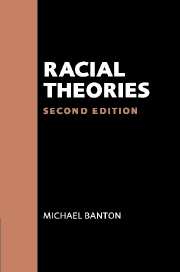5 - Race as status
Published online by Cambridge University Press: 09 November 2009
Summary
Popular ideas that individuals belong in racial groups have frequently been used to mark them out as being of different social status. This chapter carries forward discussion of the theories mentioned in chapter 4 in order to assess progress in developing conceptual frameworks that supersede the idiom of race.
In its application to human society, evolutionary theory drew attention to the way in which physical differences served as signs of membership in competing groups and called forth reactions at the level of unconscious behaviour. It also had two particular weaknesses. Firstly, it was unable to do justice to the complexities of behaviour on the conscious level. Secondly, it could not account for the importance of power relations in human society, and especially for those associated with social stratification as a form of inequality persisting from one generation to another. These weaknesses started to be remedied once social scientists undertook empirical studies of the behaviour of people involved in inter-racial relations. An entirely new phase opened in the 1930s when two of them conducted research in Indianola, a Mississippi town with a population of about 3,000, that served as a centre for a rural county in which about 70 per cent of the population was black. The first research worker was an anthropologist, Hortense Powdermaker, who aimed to present a portrait of the town as a functioning community with particular reference to the Negro population. She was followed by John Dollard, a psychologist who had undergone psychoanalysis in Berlin.
- Type
- Chapter
- Information
- Racial Theories , pp. 117 - 167Publisher: Cambridge University PressPrint publication year: 1998



